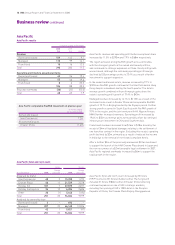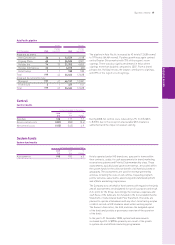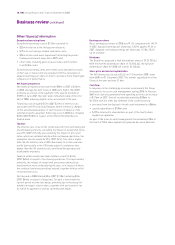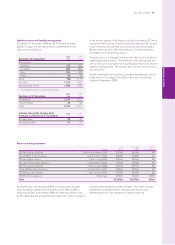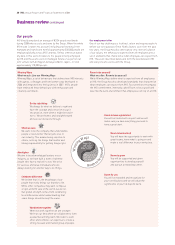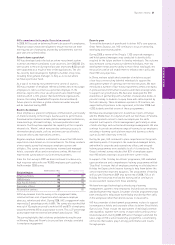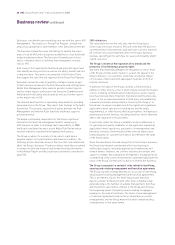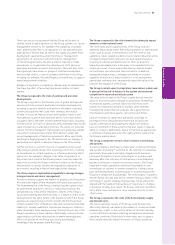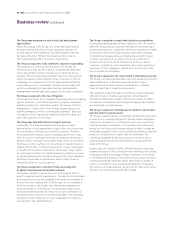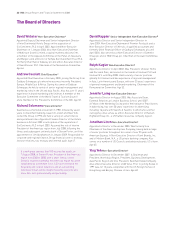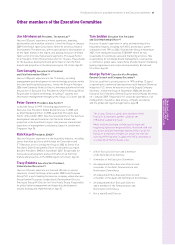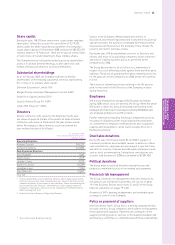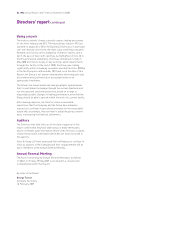Holiday Inn 2008 Annual Report Download - page 28
Download and view the complete annual report
Please find page 28 of the 2008 Holiday Inn annual report below. You can navigate through the pages in the report by either clicking on the pages listed below, or by using the keyword search tool below to find specific information within the annual report.26 IHG Annual Report and Financial Statements 2008
Business review continued
Each year, risk identification workshops are run with the senior IHG
management. The output is a ‘Group Risk Register’, divided into
areas of accountability for each member of the Executive Committee.
The Executive Committee uses the findings to identify the major
areas of risk for IHG and to assign accountability for cross-functional
leadership between them. The Executive Committee prioritises
and co-ordinates efforts to optimise the management of major
risks to IHG.
Risk ‘owners’ first quantify the likelihood and potential impact and
then identify existing controls as well as the ability, benefit and cost
to improve them. This work is documented in Risk Action Plans
that support the risks that are reported in the Group Risk Register.
Executives review the risks at quarterly strategic reviews as part
of their business review with the Chief Executive and strategy team.
Global Risk Management also submits periodic incident reports
and two major reports each year to the Executive Committee and
the Board on hotel safety and security as well as a further report
on the major risks to IHG.
The Internal Audit function is separately responsible for providing
assurance across the Group. They report their findings to the Audit
Committee. This ensures separation of duties between the Risk
Management and Internal Audit functions and hence supports
good governance.
The Board is ultimately responsible for the Group’s system of
internal control and risk management and for reviewing its
effectiveness. In order to discharge that responsibility, in 2008
the Board considered the most recent Major Risk Review which
involved extensive consultation throughout the business.
The Group is subject to a variety of risks which could have a
negative impact on its performance and financial condition. The
following section describes some of the risks that could materially
affect the Group’s business. The factors below should be considered
in connection with any financial and forward-looking information
in this Annual Report and the cautionary statements contained on
page 103.
2009 risk factors
The risks below are not the only ones that the Group faces.
Some risks are not yet known to IHG and some that IHG does not
currently believe to be material could later turn out to be material.
All of these risks could materially affect the Group’s business,
revenue, operating profit, earnings, net assets and liquidity and/or
capital resources.
The Group is reliant on the reputation of its brands and the
protection of its intellectual property rights
Any event that materially damages the reputation of one or more
of the Group’s brands and/or failure to sustain the appeal of the
Group’s brands to its customers could have an adverse impact
on the value of that brand and subsequent revenues from that
brand or business.
In addition, the value of the Group’s brands is influenced by a
number of other factors, some of which may be outside the Group’s
control, including commoditisation (whereby price and/or quality
becomes relatively more important than brand identifications due,
in part, to the increased prevalence of third-party intermediaries),
consumer preference and perception, failure by the Group or its
franchisees to ensure compliance with the significant regulations
applicable to hotel operations (including fire and life safety
requirements), or other factors affecting consumers’ willingness to
purchase goods and services, including any factor which adversely
affects the reputation of those brands.
In particular, where the Group is unable to enforce adherence to
its operating and quality standards, or the significant regulations
applicable to hotel operations, pursuant to its management and
franchise contracts, there may be further adverse impact upon
brand reputation or customer perception and therefore the value
of the hotel brands.
Given the importance of brand recognition to the Group’s business,
the Group has invested considerable effort in protecting its
intellectual property, including registration of trademarks and
domain names. However, the controls and laws are variable and
subject to change. Any widespread infringement, misappropriation
or weakening of the control environment could materially harm the
value of the Group’s brands and its ability to develop the business.
The Group is exposed to a variety of risks related to identifying,
securing and retaining management and franchise agreements
The Group’s growth strategy depends on its success in identifying,
securing and retaining management and franchise agreements.
This is an inherent risk for the hotel industry and franchise
business model. Competition with other hotel companies may
generally reduce the number of suitable management, franchise
and investment opportunities offered to the Group and increase
the bargaining power of property owners seeking to engage a
manager or become a franchisee. The terms of new management
or franchise agreements may not be as favourable as current
arrangements and the Group may not be able to renew existing
arrangements on the same terms.


